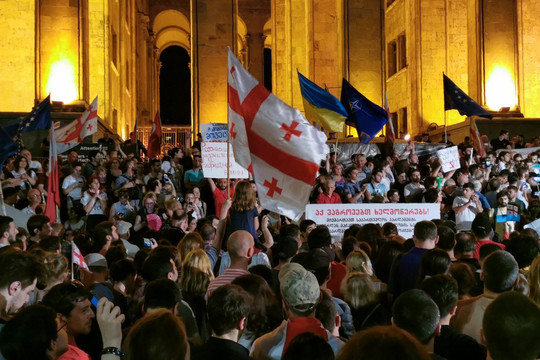Georgia: EFJ/IFJ condemn police’s heavy handed action against journalists amid riots at Parliament

According to the Independent Association of Georgian Journalists (IAGJ), journalists were forcefully removed from the Georgian Parliament building and at least ten more were injured while covering protests around Parliament in the capital Tbilisi on 20th June. The International and European Federations of Journalists (IFJ/EFJ) have urged the authorities to stop targeting journalists and to respect press freedom and the right to information.
Reports say that clashes between the riot police and the protesters started after Sergei Gavrilov, a Russian national who supports the independence of the Georgian breakaway regions of Abkhazia and South Ossetia and a supporter of Vladimir Putin, was allowed to sit in the chair of the Georgian Parliament during a session of the Assembly.
In a sign of the continuing animosity between Russia and Georgia, thousands of people gathered at the Parliament, calling for the government’s resignation. The police fired rubber bullets and used water cannons and tear gas to disperse the crowds, reports add.
At least 160 protesters were also injured and the IAGJ added that police did not give any explanation for the decision to remove journalists from Parliament building.
IFJ General Secretary Anthony Bellanger said: “We join the IAGJ in condemning the police’s heavy handed action against journalists who were only doing their job in covering a public event of high public interest. We call on the authorities to allow journalists to work safely and to strengthen press freedom in their country.”
“It seems obvious that the police deliberately targeted journalists,’, said EFJ General Secretary Ricardo Gutiérrez. “The videos show police officers hitting the head of a cameraman. The objective of the police is to prevent journalists from covering these demonstrations. We demand an end to this repression. We call on the authorities to facilitate the work of journalists instead of preventing them from doing their job.”
“Journalists were not allowed to work freely or interview public figures,” said Zviad Pochkhua, IAGJ President. “Such actions are against Georgian law and international conventions. We urge Parliament to start investigation in cooperation with media organisations, including IAGJ.”
Picture credit: Vano Shlamov/AFP.






